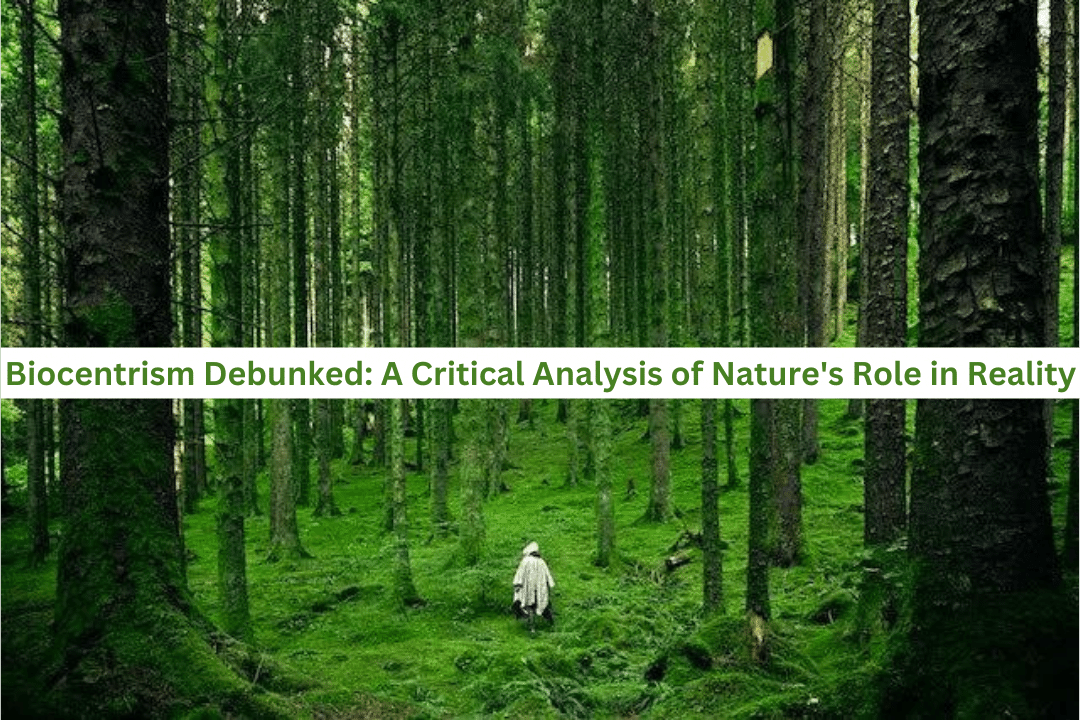Biocentrism Debunked: A Critical Analysis of Nature’s Role in Reality

In the realm of philosophy and science, biocentrism has stirred up a great deal of curiosity and debate. The concept that life and consciousness play a fundamental role in shaping reality challenges conventional paradigms. In this article, we’ll delve into the world of biocentrism, critically analyze its premises, and explore its implications while focusing on biocentrism debunked.
What Is Biocentrism?
Biocentrism is a philosophical theory that posits life as the central driving force in the universe, suggesting that life and consciousness are prerequisites for the existence of the cosmos. Developed by Dr. Robert Lanza, this theory challenges the traditional view that the universe is purely a mechanical and lifeless entity.
The Biocentric Universe: Fact or Fiction?
The Quantum Enigma
At the core of biocentrism is its reliance on quantum mechanics. Advocates argue that quantum experiments demonstrate how the mere act of observation by a conscious being influences the behavior of subatomic particles. This claim is rooted in the famous double-slit experiment, which shows that particles behave differently when observed. But does this mean consciousness shapes reality? We’ll explore whether these claims hold water or if biocentrism debunked has merit.
The Anthropic Principle
The anthropic principle, closely aligned with biocentrism, asserts that the fundamental constants of the universe are finely tuned to permit the existence of life. Critics argue that this fine-tuning doesn’t necessarily imply a conscious design but could be a result of the multiverse theory, where an infinite number of universes with varying constants exist.
The Biological Bias
One of the criticisms of biocentrism is its biological bias. Critics contend that the theory elevates life as the sole determinant of the universe’s existence while ignoring the possibility of other forms of consciousness, alien life, or non-biological entities. We’ll examine this aspect in our quest to understand biocentrism debunked.
Alternatives to Biocentrism
Panpsychism
Panpsychism, another philosophical stance, suggests that consciousness is an intrinsic property of the universe. While it shares some common ground with biocentrism, it doesn’t place life as the exclusive source of consciousness. Panpsychism introduces the idea that consciousness might exist at all levels of reality, not just within living organisms, offering an alternative perspective to biocentrism debunked.
Materialism
Materialism, the opposite of biocentrism, asserts that everything in the universe can be reduced to physical matter and energy. It suggests that consciousness is a product of the brain’s complex processes and does not play a fundamental role in shaping the universe. We’ll explore how materialism challenges the assertions of biocentrism and contributes to the discussion of biocentrism debunked.
The Implications of Biocentrism
A Paradigm Shift
Biocentrism, if valid, would lead to a profound shift in our understanding of reality. It would imply that life and consciousness are not accidental byproducts but fundamental components of the cosmos, demanding a reevaluation of our place in the universe. We’ll analyze these implications, considering the viewpoint of biocentrism debunked.
Ethical Considerations
The theory also carries ethical implications. If all of nature possesses a degree of consciousness, it could lead to a heightened sense of responsibility towards the environment and all living beings. We’ll explore whether these ethical considerations hold up in the context of biocentrism debunked.
Conclusion
Biocentrism, while a captivating and revolutionary concept, remains a subject of intense debate. Its validity hinges on the interpretation of scientific findings and the philosophical perspective one adopts. While it challenges traditional paradigms, it has yet to be widely accepted by the scientific community.
FAQs
- Is biocentrism a widely accepted theory in the scientific community?
Biocentrism remains a subject of debate in the scientific community. Many are skeptical, contributing to discussions on biocentrism debunked.
- What are the main criticisms of biocentrism?
The main criticisms include its reliance on quantum mechanics, the anthropic principle, its biological bias, and the lack of concrete evidence to support its claims, all of which are central to the discourse of biocentrism debunked.
- How does biocentrism affect our perception of the environment?
If biocentrism were true, it would encourage a heightened sense of responsibility and care for the environment and all living beings, a point discussed in biocentrism debunked.
- Are there alternative theories to biocentrism?
Yes, alternatives include panpsychism, materialism, and various religious and spiritual worldviews. Exploring these alternatives contributes to the conversation about biocentrism debunked.
- What are the practical implications of biocentrism if it were widely accepted?
If widely accepted, biocentrism could lead to significant changes in our approach to environmental conservation and ethics, as it emphasizes the interconnectedness of all life. This potential shift is discussed in the context of biocentrism debunked.
